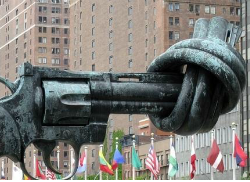
Governmental leaders began meeting the week of March 18, 2013, to once again discuss the possibility of a U.N. Arms Trade Treaty (Arms Treaty) that would regulate the $60 billion global arms trade. The desire to create regulations governing the global trade of conventional arms arose in 2006. The General Assembly of the United Nations began negotiating such a treaty in July 2012 at a U.N. conference held in New York. In December of 2012, the General Assembly voted to continue negotiations on an Arms Treaty.
If passed, the treaty would require all signatory countries to create national regulations to control the trade of conventional arms and the conduct of arms brokers. Provisions in the current draft of the Arms Treaty do not control domestic use of weapons in each signatory country “except when the trade of conventional weapons would violate arms embargoes or promote acts of genocide, crimes against humanity or war crimes.” The Arms Treaty, as proposed, calls on each country to determine whether an exported weapon would be used to violate international human rights, humanitarian laws, or be used for corrupt practices including terrorism or organized crime.
The proposed Arms Treaty follows a number of horrific human rights violations and crimes in countries all over the world. As Amnesty International Secretary General, Salil Shetty, explained, “Syria, Mali, the Democratic Republic of the Congo and Sri Lanka are just a few recent examples where the world bore witness to the horrific human cost of a reckless global arms trade steeped in secrecy.” However, there is hope as some 108 countries show their support for the Arms Treaty. Mexico even made a joint statement saying, “the overwhelming majority of (U.N.) Member States agree with us on the necessity and the urgency of adopting a strong Arms Trade Treaty. Our voice must be heard.”
Amnesty International urges that a treaty will only be passed if the five permanent members of the U.N. Security Council—China, France, Russia, the United States, and the United Kingdom—sign on to the Arms Treaty. The human rights group fears that because the five countries account for more than 60 percent of the global conventional weapons trade, their economic interests in an unregulated global arms market are too high. Furthermore, the United States serves as the largest arms manufacturer in the world, and pro-gun groups including the National Rifle Association fear potential Second Amendment violations that could result from an international arms treaty. In addition, pro-gun groups in the United States question the effect such a treaty will have on ammunition, a provision missing from the current draft of the Arms Treaty. But as Salil Shetty opined, “they have this historic opportunity to save lives – they need to seize it and stop arms from fueling atrocities.”
The United States and other U.N. Security Council members have an opportunity to make great strides for international human rights the Arms Treaty would serve as a sigh of relief for many governmental activists who have been lobbying for international arms regulations for decades. As Brian Wood, Amnesty International’s Head of Arms Control and Human Rights, explained, “around the world, people are now watching this process hoping their political leaders will not fail them – survivors of armed violence and their communities are crying out for a strong Arms Trade Treaty with clear, universal rules for human rights protection at its core.”
Stacy Harper is a 2L at Denver University Law School and a Staff Editor for the Denver Journal of International Law and Policy.

